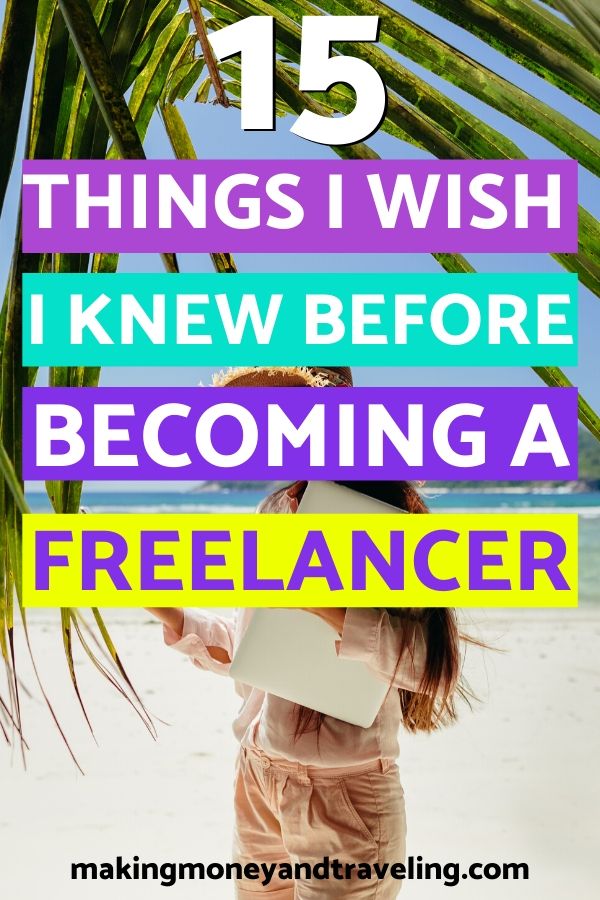When I think back to becoming a freelancer back in 2017, I see a naive and hopeful 28 year old who had no idea what she was doing.
My freelancing journey has been nothing like I thought it would be, but it has been everything I needed.
If I could go back and give 28 year old me some advice, I would have told her these 15 things I wish I knew before becoming a freelancer.
This is a long one, so check out the Table of Contents here if you're pressed for time:
1. There Is No Handbook
Welcome to the world of freelancing – where you get to figure everything out for yourself, all the time! There is no boss to ask and no handbook or standard operating procedure to reference.
When you’re just getting started, everything is up to you to figure out. And you better hope you document your processes to refer to later, otherwise you’ll be in the same spot with the next client.
One of the hardest things about freelancing for me in the beginning was the fact that I was all on my own – which is ironic because that’s what I had wanted so badly. If I had questions about something, I had to find the answers. My processes weren’t streamlined because I was learning as I went, and this is something everyone will go through.
As you gain experience with your work and with getting clients, this will become easier. But don’t say I didn’t warn you!

2. Being Your Own Boss Is REALLY HARD
Like… really hard. When you work at a job with a boss and coworkers, you are generally pretty motivated to stay on task because you know you’ll have metrics to meet… or at the very least, a boss that could walk by at any moment.
When you work for yourself, either as a freelancer or entrepreneur, you have to be a self-starter. You are the only one to check your work or ensure it gets done on time. And you are the only one who will determine if you will get paid or not.
Generally, setting deadlines for yourself can help you out when you are still learning to be your own boss. Procrastination is the ultimate enemy here.
I promise that there will be days where you literally just don’t wanna. There might be a lot of those days. And you have to figure out how to get through them.
This isn’t as hard for people who are naturally disciplined, but I have never been one of those people. And if you’re not one of those people either, there’s hope for you. But you have to be dedicated to your own success and be a little bit willing to PRETEND to be one of those people… otherwise you won’t make it.
[elementor-template id=”2450″]

Download this FREE ebook learn 60+ ways to earn an income from anywhere!
3. Freelancing Can Be Feast Or Famine
This might not be true for every freelancer, but it was definitely true for me in the beginning.
When I first started freelancing I was undercharging and overworking. I wasn’t looking in the best places to find clients and most of my clients were one-off gigs. I would accept just about any terrible rate they offered me because I wasn’t sure when or if another client would come along. At this time, I was finding clients solely off of Upwork.
Every day I wondered where my next client would come from, fully aware that if I couldn’t close another gig fast, I’d be eating ramen.
I should mention that I quit my job before I ever even tried freelancing, so it was pretty hairy from the get-go. Do not, I REPEAT, DO NOT do what I did.
4. Terrible Clients Are Real and Common
So, nightmare clients are a thing. And if you don’t look out for and stand up for yourself, you might find yourself stuck with one. And that’s okay! But know when it’s time to cut the cord.
These clients are either up your ass about every little thing, micromanaging you the whole way… or they ask for constant revisions. Or they never pay you on time. Or they ask a million questions and don’t understand what it is you’re actually doing even though they’re the ones that hired you in the first place.
If you’ve got a nightmare client who is rude, constantly asks for revisions, is overly needy, micromanages you, or never pays you on time… it’s not forever. This brings us to number 5:
5. You Can Say NO – You Can Fire A Client
So what if this is a high-paying client… if they suck, you have every right to stop working with them!
So what if you don’t know when another job this big will come along… is it really worth your well-being and sanity to work with someone that makes you want to rip your hair out? Isn’t that kinda why you became a freelancer in the first place?
When a client takes advantage of you, is rude, annoying, micromanagey, or doesn’t pay when you need them to… DUMP THEM.
You deserve better. You teach people how to treat you by how you allow them to treat you. If you don’t stand up for yourself, they won’t stop. They’ll learn that it’s okay to treat freelancers like crap and that is NOT okay. There will be other big-fish clients. And if they’re not a big fish, it should be easy to drop them.
6. Freelancing Can Be A 24/7 Job
It’s hard to have a work/life balance when work is your life. This is something I still struggle with to this day.
It’s easy to separate work and life when your work takes place in another building away from your home and has set hours. Even if you set hours for your freelancing gig, it can be easy to find yourself constantly working… because there’s always something to do and it’s just right there!
Having a healthy work/life balance takes effort, and sometimes it takes a lot of it. But it is SO important.
If you don’t put conscious effort into your life and happiness outside of work, you risk burning out. Burnout is a real psychological thing and it effects your entire life.
If you burnout, you’re going to be pretty much useless. It’s very similar to depression and no one should ever have to go through it. Take it from me, a burnout champion.
Work on your social life. Maintain relationships with your friends. If you don’t have any, get a hobby. Go to a gym. Take classes for something you’ve always wanted to do. Go to events. And make sure to separate yourself not only from your home or workspace, but your work as well.
7. You Must. Know. Your. Worth.
Wanna know what I spent WAY too much time doing? Undercharging. Not believing in myself and the value I was providing to people. Taking the lowest paying jobs simply because I thought I couldn’t land anything better.
My biggest struggle on my freelancing journey hasn’t been the low paying jobs, the terrible clients, or the sleepless nights trying to accomplish everything on my plate.
My biggest struggle has been internal. My mindset. Not believing in myself and not charging what I am worth.
As an introvert who also struggles with depression and anxiety, low self-esteem has always just been a part of the package. With that comes under-charging and not going after what you really want – and getting out of this mindset loop can be a lifelong journey for some people.
8. Imposter Syndrome Is A B*tch
Imposter syndrome… it happens to everyone. Even the wealthiest, most successful people. Imposter syndrome is feelings of inadequacy that stay with you despite your obvious successes. You tell yourself you just got lucky – or when people praise you, that they just don’t know any better.
Imposter syndrome causes chronic self-doubt about your abilities or even your right to be where you are, doing what you are doing, even though you are good at it.
You frequently feel like an imposter and that you should just go back to what you were doing before. You hold yourself back from bigger successes because you don’t feel like you are the type of person who goes after them.
This feeling doesn’t go away, but you can manage it. The most important thing is to remember that we ALL feel like that. Every single person. Even the wealthiest people – just do a YouTube search and you’ll find video after video and TED talks on it.
9. Comparison Is A Bigger B*tch
Never compare yourself to anyone! Never compare yourself to your competitors, your peers, no one. Your journey is uniquely your own, and you never know what struggles a person is facing by looking from the outside in. People only share the good stuff, and it can be easy to fall deep into imposter syndrome and depression when you compare your failures with others apparent successes.
Comparison is a trap. Don’t do it.
10. You. Need. A. Website. ASAP.
I know, I know. This isn't something you really want to hear when you first start freelancing, especially if you're trying to do everything on a really tight budget.
Websites aren't free, but they are cheap. And you need one as soon as possible!
Whether you just have your website as your go-to page with portfolio pieces and services, or if you couple that with a blog: you need a home on the web.
It's easier to use than Google Drive or Dropbox for your work and samples, it positions you as an authority in your niche, and makes you look more legit to potential clients. All of that means that you can charge more.
And yeah, a website with just your services and portfolio on it is fine. But I will always recommend blogging – writing content about what you do and what you know is the quickest way to become an authority on the topics.
11. You’re Going To Suck At Everything First. Do It Anyway.
You’re going to suck at first. At everything. It’s normal, and you need to do it anyway or you will never get better. I am a perfectionist and I have put off doing or trying so many things because of not feeling like it will be “good enough”.
If you have the same mindset, do not let it control you. If you do, you won’t get anywhere. A lot of your stuff is going to suck at first, and you are still going to get paid for it, and your clients will still be happy.
Two of the most common services I have done for clients from the beginning are freelance writing and social graphic design – like images designed for Facebook, Instagram, and Pinterest.
When I look back at the things I wrote and made when I first started out, I feel all of the yikes coursing through my body. But I got paid for them and my clients loved them! And I love looking back at those things and remembering how far I’ve come. I know that in a year from now I’ll feel the same about the things I’m doing now… probably even this article!
You will never get better if you don’t DO stuff. Do it.
12. Revisions and Constructive Criticism from Clients Aren’t Personal
I am very sensitive to criticism, even delicately delivered constructive criticism. It is so, so important that you understand that revisions and constructive criticism from clients aren’t personal.
It can be easy to take things personally, especially when it’s on a project that you felt good about or spent a lot of time on. Revisions are just revisions – your vision and your clients vision didn’t match. It’s nothing against you or your ability at all!
And constructive criticism is incredibly important in becoming a better freelancer. I have only had a couple clients give me constructive criticism – and those clients were also personal friends – but it has made me so much better at what I do.
While it may have felt difficult to hear at first, after receiving and processing the information it helped open my eyes to things I may not have realized about myself, my processes, and even my communication.
But if you have a client that is a jerk about everything you do or wants you to make constant revisions, see number 5 again.
13. Investing In Your Education is The Most Important Thing You Can Do
This should be a no-brainer, but it’s a good reminder.
And no, I don’t mean ‘go to college’. Whether you’re investing money or time – investing in your education is the most important thing you will do as a freelancer or entrepreneur.
Take courses to learn new skills and hone existing ones. Utilize platforms like Udemy, YouTube, Skillshare, and more.
You don’t have to shell out thousands of dollars for courses from “gurus” in your niche! There are so many people selling high quality courses for less than half of what the “gurus” are selling them for. Higher price doesn’t always mean better information.
Personally, I constantly invest in my learning – for myself and my clients. For example – Pinterest is a fickle beast and changes occur on the platform all the time! 1 to 2 times a month I am sitting down and reviewing Pinterest's newest guidelines and listening in on webinars so I can get the best results possible for my clients and myself.
Most importantly, invest in learning about marketing – and often. Marketing tactics change all the time! Even if you’re not offering marketing as a service, you will definitely need to know how to do it to promote yourself and get new clients. Learn about social media marketing, SEO if you’re blogging, Facebook advertising, and sales funnels. I promise it’s all way easier to learn than you think it will be at first.
14. Find One Thing and Stick With It
Shiny object syndrome, anyone?
I still struggle with shiny object syndrome. I don’t think it ever goes away, you just become better at managing yourself. Or at least I hope so…
When I first started freelancing, I had many skills that I was expanding on. And a lot of them were unrelated to one another. And I was interested in ALL of them.
So when I tried offering one service and only got a couple clients, I was convinced that maybe it just wasn’t ‘the right one’. So, I’d switch gears. I’d move to another service or offering and get a few clients… and then repeat the cycle.
Stick with one thing (or set of related things) from the beginning. Success takes time. Building up your client list takes time. Building up your portfolio takes time. Gaining experience and getting better at your offerings takes time.
If you’re constantly jumping around from thing to thing, you’re not building experience and you’re definitely not positioning yourself as an authority. People in your existing network will see you bouncing from thing to thing, and it will be hard to attract new clients with a limited track record.
15. Use Contracts and Set Deadlines From The Get-Go
Not only are deadlines important for you to get your work done, they’re important for your client too. This sets expectations at the beginning and will lessen your chances of waiting around or chasing after them to actually pay you. Set these expectations up front and save yourself the headache. And from eating cheap ramen every day.
Contracts help you enforce your deadlines, they set expectations up front, and they help protect you from clients who want to try and squeeze extra work out of you. Those clients do exist – and I wish I had known this in the beginning. Some clients will agree to work with you and then slowly ask you to do a bunch of extra things without extra compensation. Just say no!
You teach people how to treat you, and a contract up front sets clear and healthy boundaries.
A contract doesn’t have to be full of legal-ese and super complicated. What it should do is set expectations for what work you will perform, what timeline the work will be completed in, how much payment is agreed upon for this work, and in what time-frame the payment is expected be sent in.
You can find generic, editable, free freelancing templates online. Be sure your freelance contract states these things:
- Work to be performed
- Timeline in which work will be completed
- Payment that has been agreed upon with client
- How and when you will be paid (ie up front, in increments, after the project is completed, how many days after completion, etc. Be clear in this)
- (Optional) Amount of revisions you will do within the scope of the project before charging for additional changes
This is even something you can write yourself. This is for your protection – chasing clients to pay you is never fun.
My Freelancing Experience, Then and Now
I have learned so much, grown so much, and experienced so much since I started freelancing back in 2017. If you’ve made it this far, thank you! There is so much more I want to add, but this is over 3,000 words already.
The most important things to keep in mind when you are starting out on your freelancing journey is just to be open and be flexible. Freelancing is a journey, and it can lead to so many great things. You can be a successful and booked out freelancer – and you will if you stick with it, keep learning, and most importantly: keep doing.


Carrie Wilder
Carrie has a passion for location independence and nomadic lifestyles. After traveling full-time in an RV and living the van life, she created Making Money and Traveling to help others make the switch to a remote lifestyle. Learn more about Carrie on the About page or connect on social media below.
Download this FREE ebook learn 60+ ways to earn an income from anywhere!


